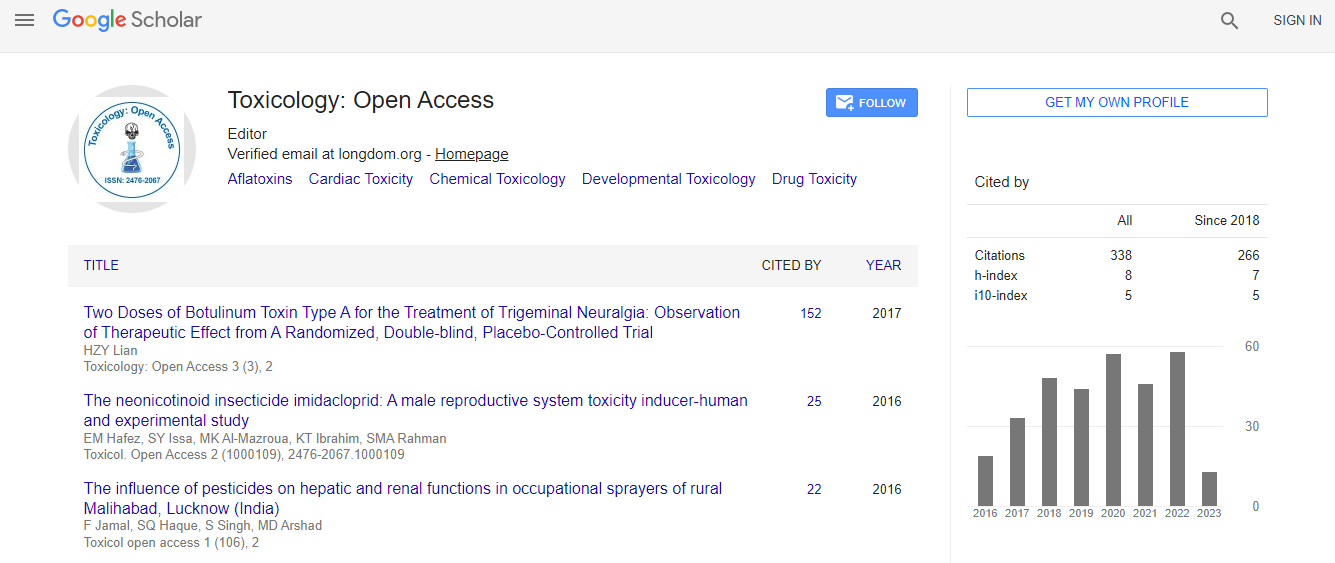Our Group organises 3000+ Global Conferenceseries Events every year across USA, Europe & Asia with support from 1000 more scientific Societies and Publishes 700+ Open Access Journals which contains over 50000 eminent personalities, reputed scientists as editorial board members.
Open Access Journals gaining more Readers and Citations
700 Journals and 15,000,000 Readers Each Journal is getting 25,000+ Readers
Google Scholar citation report
Citations : 336
Toxicology: Open Access received 336 citations as per Google Scholar report
Indexed In
- Google Scholar
- RefSeek
- Hamdard University
- EBSCO A-Z
- Geneva Foundation for Medical Education and Research
- Euro Pub
- ICMJE
Useful Links
Related Subjects
Share This Page
Novel quinolone derivatives compound (NQDC) induced autophagic and apoptotic cell death in 5FUresistant HT29 cells
8th World Congress on Toxicology and Pharmacology
Jai-Sing Yang
China Medical University, Taiwan
Posters & Accepted Abstracts: Toxicol Open Access
Abstract
In this study, novel quinolone derivatives compound (NQDC) suppressed viability in 5FU-resistant HT29 cells through inhibiting cell proliferation, causing cell cycle arrest and triggering apoptosis. In this study, we investigated the oral anticancer activity of NQDC and its mechanism in 5FU-resistant human colon cancer cells. Our results demonstrated that NQDC had an extremely low toxicity in normal oral cells and provoked autophagic cell death to form AVOs and autophagic vacuoles in 5FU-resistant HT29 cells by AO and MDC staining. DNA fragmentation and condensation occurred in NQDC-triggered 5FU-resistant HT29 cell apoptosis. Colorimetric assay analyses also showed that activities of caspase-3 and caspase-9 occurred in NQDC-treated 5FU-resistant HT29 cells. Overall, our findings indicate that NQDC is likely to induce autophagic and apoptotic death in 5FU-resistant HT29 cells.Biography
Jai-Sing Yang is a Research Fellow at Department of Medical Research, China Medical University Hospital, China Medical University, Taiwan. His main research interests include exploring molecular mechanisms of herbal medicine and new drugs against cancer development. He has set up the research platform, mainly combining molecular pharmacology, immuno-pharmacology, cell biology, drug delivery, nano-technology, animal models and bio-informatics for screening anticancer activities of herbal products or newly synthetic drugs. He focuses his work on the development of natural products, traditional Chinese medicine (TCM), drug-loaded nanoparticles and the synthesis of new compounds against different types of cancers.
Email: jaisingyang@gmail.com

 Spanish
Spanish  Chinese
Chinese  Russian
Russian  German
German  French
French  Japanese
Japanese  Portuguese
Portuguese  Hindi
Hindi 